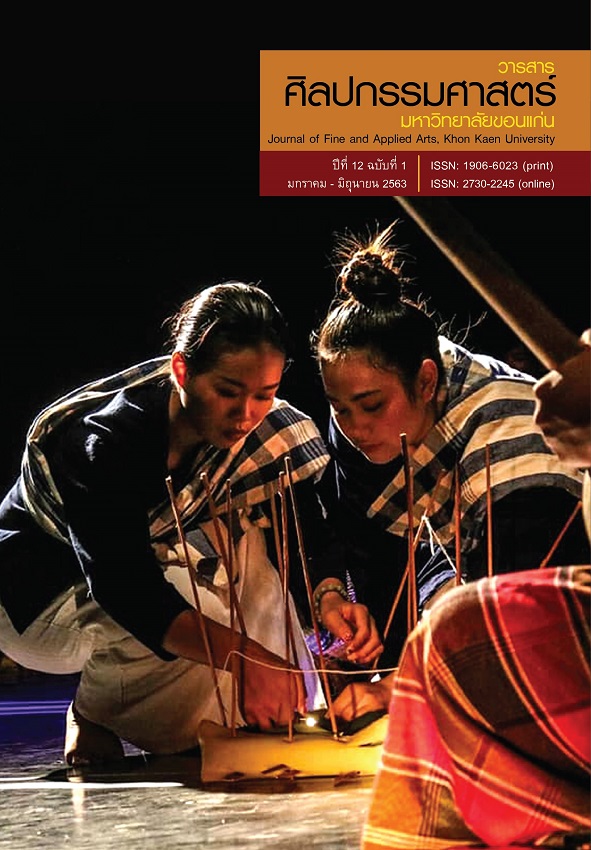Ntsum Pob : Play for Love the Culture Choose Mate
Main Article Content
Abstract
The objective of the current research was to explore the purpose of playing Luk Chuang during the New Year Celebration of Hmong. The research question is that such play is suitable for children but why the youth play it. The researcher employed a mixed method approach for data collection including documentary study and survey research. It was found that Hmong possessed their own tradition and culture as well as beliefs since their ancestor and reflected them through various traditions and cultures. These include for example, wedding ceremony, New Year Tradition or New Year Celebration, and Kin Khao Mai called by Hmong as Noj Peb Caug and translated as “Gin Sam Sib”. Hmong follows lunar day starting from the 1st day to the 30th day of the waxing moon according to the lunar calendar which is divided into 15 waxing moon days and 15 waning moon days, and 30 days of the lunar become 1 month. The last day (30th day) of the last month (12th month) is regarded the year end farewell. New Year ritual consists of 2 activities. 1. Belief ritual is only in a 3-day period of the 1st – 3rd days of the 1st month. The ritual includes dab quas by killing chickens to offer to ancestor, ghosts, and gods, and lamps are constantly lightened up days and nights during these whole 3 days. This ritual is believed to provide fortune to every family member during the whole new year. 2. Plays and celebrative activities are field activities comprising singing and dancing, throwing Luk Chuang , playing tops, blowing Khaen, Hy Kue Jia, shooting arrow, for example. The activity may or may not be held on the New Year Noj Peb Caug but mostly it was held along with the ritual. New Year celebration is the tradition the Hmong attentively look forward to since it is the time of meeting among relatives and making a wish from sacred figures and the seniors. It is the day for the youth in the village to choose their mate. Traditional sports and plays are arranged such as tops, luk chuang, and wood wheel contest as a very challenging and interesting sport. Throwing luk chuang or courting is done by throwing or playing luk chuang called “ntsum pob” as a ball-like rounded shape of fabric pieces in small size to be held in one hand. Players are divided into 2 sides, females and males. Before playing, females pass in luk chuang to males or females’ relative offer luk chuang to males. Once an agreement is made, luk chuang will be thrown by females while males stand side by side in line formation with both male and female facing each other in a moderate distance and throwing luk chuang to one another back and forth while talking to the partner. Hmong is an ethnic group who remain stringent to their culture and traditions. Courting is not allowed at home as it is morally wrong. Courting or choosing a mate has to be made through plays. However, it had long been disappeared at the current age. Preserving this culture provides distinctive identity of the ethnic group.
Article Details
Content and information in articles published in the Journal of Fine and Applied Arts of Khon Kaen University is regarded as the opinion and sole responsibility of the author(s) directly; therefore, editors are not obliged to agree to or share any responsibility with regard to the content and information that appears within these articles.
All articles, information, content, image, etc. that have been published in the Journal of Fine and Applied Arts of Khon Kaen University is the copyright of the Journal of Fine and Appllied Arts of Khon Kaen University. Any person or organization who wishes to distribute all or parts of the articles for further dissemination or other usage must first receive permission from the Journal of Fine and Applied Arts of Khon Kaen University before proceeding to do so.
References
การโยนลูกช่วง. (2556). ค้นเมื่อ 29 ธันวาคม 2559, จาก http://www.khaoyoi-thaisongdam.com/ pageconfig/viewcontent/viewcontent1.asp?pageid=211&directory=1739&contents=2082
จิรวัฒน์ พิระสันต์. (2559). วัฒนธรรม ภูหินร่องเกล้า ภูทับเบิก เขาค้อ. พิษณุโลก: อาร์พริ้นติ้ง.
ชาวเขาเผ่าต่าง ชาวเผ่าม้ง. (2562). ค้นเมื่อ 1 มีนาคม 2562, จาก http://www.sawadee.co.th/ thailand/hilltribes/hmong.html
เตรียมให้แก่เทศกาลเล่นโยนลูกช่วงลอดห่วงเวียดนาม-ลาว-จีนปี 2013. (2556). ค้นเมื่อ 29 ธันวาคม 2559, จาก http://vovworld.vn/th-TH/ขาวเดน/เตรยมใหแกเทศกาลเลนโยนลกชวงลอดหวงเวยดนามลาวจนป๒๐๑๓-188714.vov
เทศกาลเล่นโยนลูกช่วงลอดห่วงเวียดนาม-ลาว-จีนปี 2013. (2556). ค้นเมื่อ 29 ธันวาคม 2559, จาก http://vovworld.vn/th-TH/ขาวเดน/เทศกาลเลนโยนลกชวงลอดหวงเวยดนามลาวจนป๒๐๑๓-183144.vov
ธนวรรณ เวียงสีมา. (2558). วัฒนธรรมการเล่น. วารสารวิชาการมนุษย์ศาสตร์และสังคมศาสตร์ มหาวิทยาลัยราชภัฏอุตรดิตถ์, 2(2), 43-52.
ธนวรรณ เวียงสีมา. (2560). บันทึกภาพ เทศกาลปีใหม่ม้ง ในหมู่บ้านวัฒนธรรมชาวเขาบ้านเข็กน้อย ตำบล เข็กน้อย อำเภอเขาค้อ จังหวัดเพชรบูรณ์ ระหว่างวันที่ 29 ธันวาคม พ.ศ. 2559 – 6มกราคม พ.ศ. 2560. [ม.ป.ท.: ม.ป.พ.].
นัฐวุฒิ สิงห์กุล และชินวร ฟ้าดิษฐ์. (2548). ภาคผนวก: ทบทวนภูมิปัญญา ท้าทายความรู้. ใน ศูนย์มานุษยวิทยาสิริธร (องค์กรมหาชน). ภูมิปัญญาไทย-ภูมิปัญญาเทศ. (หน้า 47–87). กรุงเทพฯ: ศูนย์มานุษยวิทยาสิริธร (องค์กรมหาชน).
ประเพณีโยนลูกช่วงของชนเผ่าไทในเวียดนาม. (2559). ค้นเมื่อ 29 ธันวาคม 2559, จาก http://vovworld.vn/th-TH/วฒนธรรม/ประเพณโยนลกชวงของชนเผาไทในเวยดนาม-412951.vov
ประเพณีและวัฒนธรรมม้ง. (2552). ค้นเมื่อ 29 ธันวาคม 2559,จาก http://www.oocities.org/ hmoobthaib/culture.htm
ประวัติปีใหม่ม้ง. (2559). ค้นเมื่อ 1 ธันวาคม 2559, จาก http://www.hmongseo.com/index.php? topic=28.0
ปีใหม่ม้ง. (2560). ค้นเมื่อ 2 มกราคม 2560, จาก https://th.wikipedia.org/wiki/ม้ง
รายงานผลการศึกษาการมีอยู่ การเปลี่ยนแปลง ปัญหาและความต้องการของชาวตำบลเข็กน้อย. (2558). ค้นเมื่อ 29 ธันวาคม 2559, จาก http://hmongthaiculture.blogspot.com/2015/04/blog-post_30.html?m=1
ลูวิส, พี. และ ลูวิส, อี. (2528). หกเผ่าชาวดอย. (ศิริวรรณ สุขพานิช, ผู้แปล). เชียงใหม่: หัตถกรรมชาวเขา.
สถาบันวิจัยประชากรและสังคม มหาวิทยาลัยมหิดล. (2559). สุขภาพคนไทย 2559: ตายดี วิถีที่เลือกได้. นครปฐม: มหาวิทยาลัยมหิดล.
สยามรัฐออนไลน์ ภูมิภาค. (2562). จ.พะเยางดงามวิถีม้ง“น่อเป๊โจ่ว“ แข่งฟอร์มูล่าดอย โยนลูกช่วง หนุ่ม สาวระรื่นในชุดประจำเผ่าสุดวิจิตร. ค้นเมื่อ 20 มกราคม 2562, จาก https://siamrath.co.th/n/61858
เสน่ห์น่านวันนี้. (2559). ค้นเมื่อ 3 มกราคม 2559, จาก https://www.facebook.com/CharmNanToday/ posts/943313749038486/
Howe, N., & Strauss, W. (2007). The next 20 years: How customer and workforce attitudes will evolve. Harvard Business Review, 85(7–8), 41–52, 191.
Wikipedia. (2011) Theory of generations. Retrieved December 8, 2017, from https://en.wikipedia.org/wiki/Theory_of_generations


